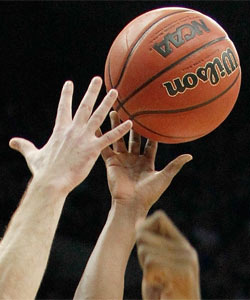 For all its promise, the NCAA basketball tournament, like Tootsie Rolls and every Wes Anderson film after Rushmore, can only disappoint. Only an event with the potential to send you into raving ecstasy has the power to let you down in equal measure. Any exhilaration you felt before tip-off of the first game has blistered over into an open sore of depression and regret by the end of the first weekend. Thinner than Vitale’s locks is the line between March Madness and March Sadness.
For all its promise, the NCAA basketball tournament, like Tootsie Rolls and every Wes Anderson film after Rushmore, can only disappoint. Only an event with the potential to send you into raving ecstasy has the power to let you down in equal measure. Any exhilaration you felt before tip-off of the first game has blistered over into an open sore of depression and regret by the end of the first weekend. Thinner than Vitale’s locks is the line between March Madness and March Sadness.
It’s not just the brackets—the goddamn brackets—whose untold drama and fury on Thursday morning are a red-penned clusterfuck on Monday. It’s what the brackets represent: The annual reminder you’re not half as smart or crafty as you believed yourself, all your inadequacies and unforgivable sins spelled out on one handy 64-team grid.
Greed. Your pursuit of wealth, status, and power has compelled you to join forces with evil entities like Kentucky and Duke. Often they win, but the cost is your earthly soul, laid forever on the viscera-slicked altar of Beelzebub and Billy Packer. Other times when you see that #2 seed you hate but write in anyway, they go ahead and lose just to screw you. That’s why they’re evil.
Gluttony. Your insatiable appetite led you to consume multiple brackets in multiple pools and now you can’t, for life of you, figure out whether it makes more sense to root for Butler to beat Pitt or Pitt to beat Butler. Either way, congratulations: You turned an exciting game into a senseless crisis. Idiot.
Sloth. Though some part of you may have suspected that Morehead State would oust Louisville, you were too lazy or careful to put your money where your balls are. This failure of imagination destroys you, because that pick would have made you look smart to the others in your pool. (Who, by the way, are too deep in their own bracket hells to notice who’s smart.)
Envy. Aquinas once described envy as “sorrow for another’s good.” Smart man, St. Thomas, even if he died by bonking his head on a tree branch while riding a donkey. Every time you read some spoiled Heels fan’s blustery message board claims, or watch a chiseled future NBAer run roughshod over a bunch of overmatched stiffs who snuck into the tournament with an unlikely conference win: That’s sorrow for another’s good. If playing in the tournament is built on the pure sportsmanship of amateur athletics, the act of watching it is a flimsy shack constructed of jealousy and spite.
Pride. You pick your underachieving alma mater to win it all, just like you do every year, and they blow it like they do every year, because it’s really, really hard to win the national championship. The year you give up on them and pick with your brain instead of your heart, they win it all to punish you for your lack of school spirit. No more annual donations to your alma mater.
Lust. Basketball is not a particularly sexy game. But I admit I have in the past picked Arizona to make the Final Four because they’ve got the hottest cheerleaders and I hoped to watch them jump around for a couple extra games. Bonus: When Arizona loses, I get to watch them cry tears of undiluted spirit-crushing agony.
Wrath. Whether you’re still pissed at Wisconsin for turning you down for grad school in 1995, or you can’t stand the sight of Bob Huggins’s beady eyes wherever he’s coaching, there are some schools you consider so poisonous that you will never recognize them as a good bet. For more than two decades, no matter what kind of regular season they had, I’ve avoided Syracuse like scabies because they got knocked off early a few times during my formative tournament years. Even after they won the national championship in 2003, I still saw them as losers. Still do. Jim Boeheim could win four more titles, cure cancer, and find the lost continent of Atlantis, and he’d still be a loser. The fact that Boeheim will go to his grave wearing a championship ring and I can’t even finish in the money in my stupid $110 office pool is immaterial here.
What do we learn from all this? That we fans never get our One Shining Moment, not at the opening tip-off nor the final buzzer, nor even when a pimply kid from some school you never heard of hits a crazy runner at the buzzer to K.O. a team you hate. We learn that excitement will give way to anger that we let ourselves, once again, be suckered into caring when history has given us every reason not to, and we’re once again struck with the knowledge that, like everyone else, we are petty and weak and destined to repeat the same mistakes time after time. And that Duke, no matter what year it is, can still bite it.


